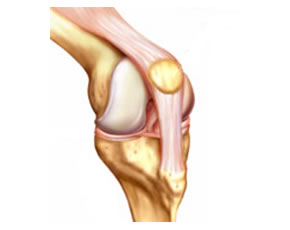Greater strength of the quadriceps muscles supporting the knee has been associated with decreased pain and better knee function in individuals with knee osteoarthritis (OA); however, whether higher quadriceps strength prevents further cartilage loss has yielded mixed results. Here, Amin et al (Arthritis Rheum 2009; 60(1): 189) explore the effects of quadriceps strength on knee cartilage volume using MRI.
Methods
Subjects were participants in the Boston OA Knee Study (BOKS). BOKS enrolled male and female veterans with symptomatic knee OA. Participants underwent knee MRI at baseline and at 15 and 30 months, which were evaluated for cartilage pathology using the Whole-Organ Magnetic Resonance Imaging Score (WORMS) method. Isokinetic quadriceps strength, knee alignment, and self-reported knee pain (measured on a visual analogue scale) and function (measured with the WOMAC questionnaire) were assessed at baseline and follow-up.
Results
A total of 265 patients (58% male) had MRI and quadriceps strength measurements, with complete MRI data available on n = 222. At baseline, participants were an average of 67 years of age with an average BMI of 31.5. The majority (77%) had moderate to severe radiographic OA (i.e. Kellgren-Lawrence grade ≥ 2).
Among the 118 knees (45%) with medial tibiofemoral cartilage loss, the 58 knees (22%) with lateral tibiofemoral cartilage loss, or the 58 knees (22%) with medial patellofemoral cartilage loss, there was no association of cartilage loss with baseline quadriceps strength in either crude analyses or with adjustment for malalignment. Results were similar for men and women. Among the 50 knees (19%) with lateral patellofemoral cartilage loss, participants in the highest tertile of quadriceps strength demonstrated a lower frequency of cartilage loss compared to those in the lowest tertile (OR 0.4 (95% 0.2, 0.9) after adjusting for baseline cartilage score, age, BMI, gender, and follow-up time).
Compared to those with the lowest quadriceps strength, those with higher quadriceps strength reported lower pain and better function than those with lower quadriceps strength at baseline and follow-up.
Conclusions
Greater quadriceps strength in patients with symptomatic knee OA was associated with lower pain, higher reported function, and lower progression of lateral patellofemoral cartilage loss. Quadriceps strength did not protect against cartilage loss in other knee compartments in these patients.
Editorial Comment
These data help clarify some controversy in the association of muscle strength with progression of knee OA. In general, it would appear that quadriceps strength does little to affect the rate of overall OA progression. However, the results of this observational study do not address whether interventions to strengthen the quadriceps in knee OA sufferers would have different results. Even with no effect on progression of cartilage loss, improvements in pain and function would merit efforts to increase quadriceps strength in these patients.


